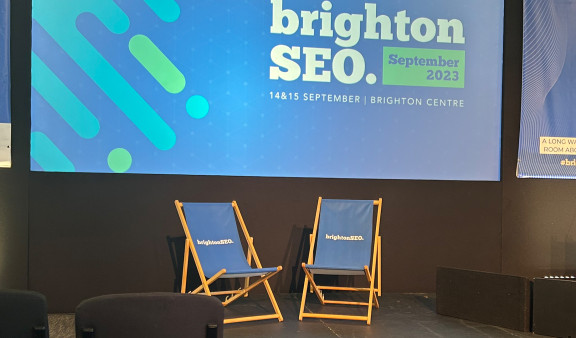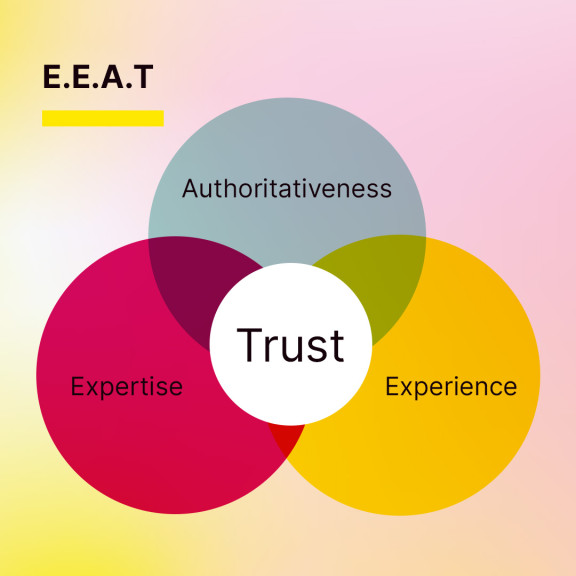
Trends and insights into SEO in 2023
Improve search engine rankings? Yes please, but how? I was lucky enough to attend the September edition of BrightonSEO where experts gathered together to discuss best practices, tips, tricks, insights and the future of SEO. With the rise of AI and digital marketing professionals wondering if their job will still exist in a couple of years, there was plenty to discuss. Want to know what I learned? Read on, MacDuff!
Is AI going to replace digital marketers?
Let’s start with the most burning question that is on every (digital) marketer’s mind in 2023. Short answer: no. However, there is an important caveat. AI shall have to be leveraged correctly by people in digital marketing (and other industries too), because as someone put it very eloquently:
AI will not replace you, but someone using AI will
Automation has been around since the design of the assembly line, so why would marketing be any different? Think of the way accounting has changed over the last 3 decades: instead of physical invoices, most of this is done digitally, and data is organized in digital spreadsheets.
TAKEAWAY:
Tools are useful to speed up boring tasks: the trick is to be clever about what you automate and where you keep creative control.
Don’t be a Mickey Mouse anno original Fantasia and automate or use AI without thinking any further, as Syphaïwong Bay put it during her talk. You might end up with an army or automated tasks (brooms) without realizing what they do exactly, and if ithey are actually helping or hindering you in your job performance.
How do brands benefit from SEO?
One of the first talks I attended touched on the subject of brand messaging, basically stating that you should not overcomplicate things in order to achieve conversion. Because if people cannot find what they are looking for they do not convert at all.
Good copy cannot fix bad messaging
TAKEAWAY:
Follow the rule of 1 for your brand message (1 idea, 1 reader, 1 promise), don’t talk about yourself but how you can make their life better and be concrete about it. People can only hold 7 things in their mind at any given time, so make sure it’s about them and show how you can make their life better using visual language. This requires quality content based on thorough research of your target audience, your product USPs and data.
Content: quantity or quality?
The time of producing content willy-nilly is over. Although publishing content regularly is still important, search engines do not look for quantity but quality these days. If you make it easy for search engines to crawl your content, it will not only improve your sustainability as a brand, but also ecologically. The less time and energy a bot needs to spend to find the content it needs, the less time a human needs to spend to find what they are looking for: information or a solution to their problem, be it a product or a service.
I didn’t do things for SEO, but the result is visible in SEO.
It means that evergreen content is becoming increasingly important too: why write 20 articles about the same thing, when you can convey the information in different formats instead.
TAKEAWAY
Don’t get tied down by what SEO is supposed to do: the classic SEO approach is not always the best for everyone. Make sure you provide your marketing team with time and space to research and test what works for you and map out the user journey and user intent that is relevant for your business.
Trends for data
What are the trends for data in SEO?
Look, as a copywriter, I don’t always go wild about spreadsheets full of data. If I can go and do my own research on a specific topic, however, wild horses cannot keep me down. Luckily for me, there are some new trends for data research which support this. Because whatever way you turn it, data is still useful for writing content: just experiment when and where you want to incorporate it in your workflow, and where you are getting your data.
Don’t limit yourself, or your tools
This quote is what I distilled from the various talks on data, keyword research, and other more technical subjects.
TAKEAWAY
The sky is the limit when it comes to data, so a holistic approach is advised. Thierry Ngutegure pointed out that data should be shared across teams within your organization; make use of that CRM, all that existing customer data sitting idly in your data silos. And don’t always trust your keyword research tools as they might limit the results or are not able to make human connections; misspellings might be more relevant than you think.
Build trust with conversational intelligence
Quality content is part of this, but don’t forget about any technical implementations that can make life so much easier for people to find you and the information they are looking for.
TAKEAWAY
Your website is your destination (Ray Saddiq), so make sure it is optimized for your visitors with good UX (User experience). Small changes for the better can mean a world of difference for your ranking. But do them nonetheless and fix any details later on.
And in terms of content, either offline or online, make sure you talk to people and not at them. Remember the first takeaway about brands and not talking about yourself? Make an emotional connection with your audience by talking about them, not you.
Cheat overview of takeaways, an ABC of SEO takeaways if you will
- AI is not going away, so you need to be clever about how you use it.
- Brands should evaluate their key message and not overstimulate their audiences
- Content is key, so invest in quality overtime
- Data is a basic right and should be shared
- E-E-A-T is here to stay, so talk to people, not at them
Finally, my conclusion is that the future of SEO is bright. I didn’t need convincing of this, but you might have to prove to your manager why they should invest in it because everything comes down to ROI, doesn’t it? Anna Bravington gave some good tips in her presentation on strategy, especially on a strategy to sell SEO to your CEO, which boils down to a special version of “teamwork makes the dream work” with a dash of living documentation that is translated to the language of your internal stakeholders.
Do you need help creating strategies that will benefit your business, or any other aspect I touched upon above? Get in touch, because if anything, going to Brighton to learn more about SEO trends only confirmed that we at SQLI can do it all: analyze your website and additional data, develop your website and landing pages with UX in mind, and of course create content that works for your audience. So, drop us a line, and we’ll be glad to set a course together with you.



